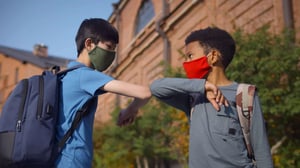3 min read
An Endemic State of Covid-19: What Will it Mean for Schools?
Chris Joffe
:
February 3, 2022
Next month will mark the two-year anniversary of the WHO’s declaration of Covid-19 as a global pandemic. Two years in, we’re beginning to see increased speculation that Covid may be shifting into an endemic state, where outbreaks are consistently present but more predictable and slower to spread.
 According to Dr. Monica Gandhi, an infectious disease doctor at the University of California, San Francisco, “What an endemic phase of a viral infections means is that it's not causing the terrible hospitalizations of the pandemic phase but that we'll have enough immunity of a population so it's kept down to low levels.”
According to Dr. Monica Gandhi, an infectious disease doctor at the University of California, San Francisco, “What an endemic phase of a viral infections means is that it's not causing the terrible hospitalizations of the pandemic phase but that we'll have enough immunity of a population so it's kept down to low levels.”
While most experts agree that we are not there yet, we anticipate that we may be seeing this shift occur sometime this year. One tricky piece of this puzzle is: Who will get to endemic first? The truth is that while some communities, countries, and states might get to a point of relaxation sooner, endemic is likely going to be a worldwide event. As Dr. Fauci has reiterated time and time again, if one tree is still burning, the whole forest is still at risk.
What will an endemic state of Covid mean for schools?
 First, it is important to remember that the endemic state of Covid is not the same as pre-Covid. In an endemic, our goal is to get to a state where precautions are minimally impactful and are integrated into regular life, rather than reverting back to the way things were. Take the flu, for example, we get annual flu shots, get tested, and keep our distance from others when we have flu symptoms because endemic flu has become part of life. This is where we hope to see Covid heading in the long term - but we’re not there yet.
First, it is important to remember that the endemic state of Covid is not the same as pre-Covid. In an endemic, our goal is to get to a state where precautions are minimally impactful and are integrated into regular life, rather than reverting back to the way things were. Take the flu, for example, we get annual flu shots, get tested, and keep our distance from others when we have flu symptoms because endemic flu has become part of life. This is where we hope to see Covid heading in the long term - but we’re not there yet.
As we begin to see Covid become less widespread, we will be tempted to relax health and safety protocols and shift back into a pre-pandemic approach. In the immediate term, we believe it’s best to hold on making major changes and keep most health and safety policies and protocols in place. We also strongly recommend keeping existing health staff in place, and ensuring any funds that have been earmarked for health and safety needs stay consistent as well. This will provide flexibility and nimbleness to respond to localized outbreaks and/or new variants that cause surges.
In the longer term, it may make sense to begin to rethink protocols. Start by considering which Covid policies seem to be working for staff, students and families, and making those more permanent than they are today. This may include vaccine mandates, ventilation, mask-wearing, and frequent handwashing. (You may continue to utilize some of these even when local or state guidelines no longer require them.)
What information should guide our decisions on health and safety as Covid becomes endemic?
As we begin to consider whether and when to begin to change policies, it will be important to look holistically at the data that might impact our community. For example, we recommend examining the following data points to start. Having answers to these questions will put us in a better position to make an informed decision about next steps:
|
State, Federal and Local Guidelines |
|
|
Vaccination & Vulnerability within Our Community |
|
|
Rate of Covid Cases in Our Community |
|
|
Protocol Changes in Surrounding Schools |
|
|
Potential Variants |
|
How can we plan ahead?
As we look ahead to the potential endemic state of Covid, developing a plan (or at least a starting point for one) will help ensure we are prepared for the shifts and changes that may take place. To start this process, begin by looking at what your community is doing now in a few key areas. Then, discuss how each of these might change once we’ve shifted from “pandemic policies” to “endemic policies.” Some things to address might include:
|
Pandemic (Current) State |
Endemic (Future) State |
|
|
Information & Inputs |
What key information/inputs are we using now to make decisions? (e.g. CDC guidelines, County Department of Public Health, local transmission numbers, updates from surrounding schools) |
Will we rely on different information for decision-making in the future, and/or will we weigh the sources of information differently? |
|
Decision Making |
What is the process for making decisions related to school health currently? |
Will this process or the people within it change? |
|
Vaccination |
What are our current vaccination policies and requirements? |
Will our vaccine requirements change once Covid becomes an ongoing recurring virus? |
|
Contact Tracing & Case Management |
What is our current process and protocol for contact tracing and quarantining? |
Will we change this process, and/or shift contact tracing responsibilities to individuals and families testing positive? |
|
Testing |
How do we provide and process tests currently? |
What testing options will we offer staff and families in the long term? |
|
Precautions |
What precautions are we currently taking to reduce the spread of the virus? (e.g. social distancing, masks, ventilation, deep cleaning, routine hand washing, etc) |
Which of these precautions will we keep, and which will we phase out? |
|
Community transmission levels |
What community transmission thresholds currently prompt us to revisit our approach? |
What community transmission levels would prompt shifting our approach in the future? |
Whether or not your community has started to discuss the future of Covid as an endemic virus, the reality is that it is likely to move in that direction soon. Asking these questions and having these conversations now will help us continue to protect students and staff today, while planning for a safe and healthy tomorrow.

